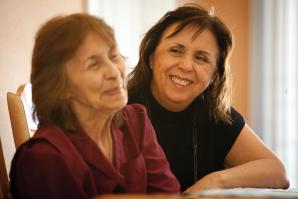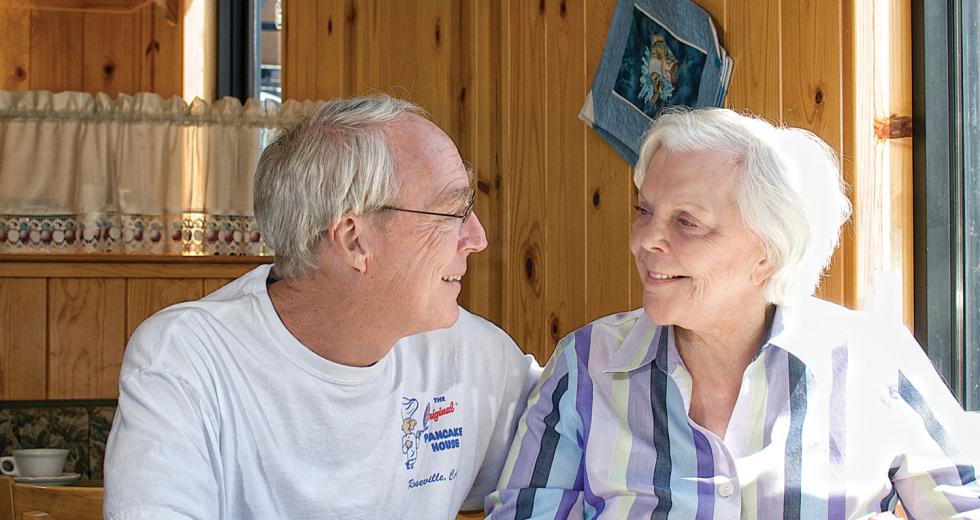When his mother fell for the second time, Steve Smith was ready to put the plan in motion.
At that point his widowed mother lived in a San Diego retirement community in a detached bungalow. It wasn’t quite the townhome she used to live in, where she puttered around her English garden. But it still gave her plenty of freedom, which in the end turned out to be too much for someone suffering from Alzheimer’s disease.
It cost $6,200 a month to live there. She doesn’t have long-term care insurance. She did have a caretaker who would visit during the week to help with chores and drive her to the store, but on the weekend Smith’s mother was alone. Smith, who lives in Foresthill with his wife, got the call the first time she fell. Outside the scratch on her forehead, she was OK. He talked with his sisters, and as a family they decided to leave her be.
“We could tell her memory was deteriorating,” Smith said. “We took it at face value that she was just getting older.”
Then she fell again and required stitches in her head. Nobody knew why she kept falling — until they stepped inside the bungalow. Cold toast in the toaster, a sandwich on the counter: She would make a meal and forget to eat it. His mother was malnourished, and at 85 years old her days of independent living were done.
“It’s a very difficult conversation for children to have with their parents,” Smith says. “You’re telling them ‘As strong willed as you’ve been and despite everything you’ve done in life, we don’t feel you can take care of yourself anymore.’”
Difficult as it may be, experts say a discussion about how to care for someone in their twilight years should happen sooner than later. Stifled by diseases that impair memory and mobility, elderly people face greater risk of being hospitalized. Therefore, thorough medical, financial and living plans should be hammered out in advance, so family members or friends can make quality decisions for care, according to Lesley Clement, renowned elder abuse attorney at Clement & Associates in Sacramento.
In the worst cases, she says, a person may have a stroke, a hip fracture or a heart attack that lands them in acute hospital care, and caregivers have no idea what to do.
“Unfortunately, a lot of times, the heart comes in stronger than the head,” Clement says. “They don’t want you to die even if you’re going to be a vegetable, even if you’re going to live in a nursing home for the rest of your life. If that’s not what you want, you better spell it out in a document now.”
The plan in the Smith family wasn’t anything formal. It actually sprouted out of a family joke, Smith said: “Okay, mom, when you can’t be on your own, you can live in my garage,” he would tell her. But on Christmas three years ago, it wasn’t a joke anymore.
Smith knew she would protest. He knew she would cry. But it didn’t matter. He and his wife had already set up a bedroom and a living room for her, where she would be able to move all of her old furniture. As owners of a local Pancake House, Steve and his wife work during the day, but they hired a companion to lend assistance, which he says adds up to about $2,200 a month.
With a durable power of attorney for health care form, Clement says, elderly people can specify what should happen in a given circumstance: Do you want artificial feeding? How aggressive do you want your health care providers to be? How do you want to live?
Family members get traumatized, she says, so a document that provides these types of details is vital. On the flip side, she has seen families get a call from the hospital telling them to pick a nursing home within hours for their parent or spouse because they’re about to be discharged.
“It’s really scary what happens to people,” Clement says. “If caregivers don’t know specifically what your wishes are, they’re not going to know what to do.”
If anybody understands this idea, it’s Kelley Dykstra of Granite Bay. Her grandfather had dementia and her grandmother had Alzheimer’s, and she was their primary caregiver. They lived in a retirement home that cost $8,000 a month for the two of them.
“We had all the extended health care for my grandparents, but Alzheimer’s and dementia wasn’t covered,” she says. “You can do all the planning you want to, but when they’re diagnosed with something like this, I don’t think anybody can prepare for it.”
They have since passed away, but this past January, Dykstra’s mother-in-law was also diagnosed with Alzheimer’s. Her mother-in-law, at 5 feet 8 inches, had dropped to 102 pounds, malnourished because she kept forgetting to eat and drink.
“We were afraid that as thin as she was getting, she was not as sturdy,” Dykstra says. “We knew she really wasn’t capable of caring for herself.”
Dykstra and her sister-in-law decided she would be better served at an all-â?¨inclusive home specifically for people with Alzheimer’s. She gained back 12 pounds in the first three months of care.
The home costs $5,000 for monthly care. Long-term care insurance reimburses $4,200 for the day care, but Dykstra has to put up the remaining $800 and another $500 for monthly medication, which comes out of the family savings.
“Looking back, even though we thought we had everything planned, we never planned for dementia and Alzheimer’s,” she says. “There’s nothing harder than taking your family member’s independence away from them.”
Both Dykstra and Smith acknowledge the importance of support groups when it came to planning. That’s how they learned how to handle certain situations and realize they weren’t going through it alone. At the Alzheimer’s Association, based in Sacramento, Smith says he got tips from other people, took classes and learned how to be creative in stressful situations.
He brings up an example of a woman in one of the classes whose husband had short-term memory loss and couldn’t remember the difference between flowers and weeds in the garden. Gardening had been a big part of his life and he still loved it, but he kept pulling up flowers, destroying the landscape. One day she got an idea to visit the hardware store and buy some blue paint. She put a glob of it on every weed, so he could easily tell which ones to pull.
Through stories such as this one, Smith began to realize that he couldn’t look at life solely from his own perspective. He couldn’t get mad when, on the way home from the theater, his mother forgot she had been to the theater. Proper planning, whether for medical, financial or daily living decisions, requires caregivers to ask questions to gain a better understanding.
“It’s not about what they remember; it’s about what they’re enjoying at the time,” he says. “When I go home, if I ask my mom what she did today, she will look at me and say, ‘I don’t know, but I know I had a wonderful time.’”
Recommended For You

Family Values
Negotiating your personal worth as a caregiver
When Shelley Tabar’s father fell off her roof, she became his primary caregiver and subsequently lost nearly half her income.



